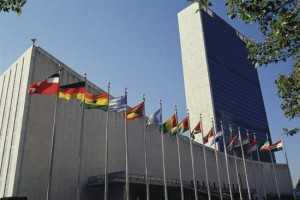Abortion Promoters Intent on Infiltrating Development Goals
 The international abortion lobby has experienced twenty years of stalled progress at the UN, but an article by one of its leaders reveals their ongoing efforts to promote their agenda in the upcoming plan for global development.
The international abortion lobby has experienced twenty years of stalled progress at the UN, but an article by one of its leaders reveals their ongoing efforts to promote their agenda in the upcoming plan for global development.
Françoise Girard, president of the International Women’s Health Coalition, describes efforts to advance the concept of “sexual and reproductive health and rights” (SRHR) – a term that has not been accepted in any global negotiation at the UN.
Of particular interest to Girard is access to “SRHR services” such as contraception, and sterilization, “comprehensive” sexuality education for adolescents, legal abortion, recognition of “sexual rights”, and special protections on the basis of sexual orientation and gender identity.
“Advocates debated whether the moment was opportune,” writes Girard. “What tipped the balance were the coming debates over the next development agenda, […] Remaining in place, while all other agendas moved forward, would be tantamount to a retrenchment.”
The UN faces two important milestones: the twenty-year anniversary of the International Conference on Population and Development (ICPD) – the meeting in Cairo where advocates unsuccessfully campaigned to establish an international right to abortion – and the establishment of a set of goals to replace the Millennium Development Goals (MDGs), which expire in 2015.
Girard’s focus is twofold: first, to expand the ICPD agenda to include SRHR, including abortion, and second, to ensure that the development goals borrow heavily from the ICPD framework, unlike the MDGs, which focused on tangible targets like the reduction of maternal mortality.
Girard takes note of several key obstacles to the SRHR agenda: an “increasingly difficult multilateral environment” at the UN in New York, disputes between the global North and South over trade, climate, and finances, the erosion of the Obama administration’s influence, and the European Union’s lack of consensus on issues like sexual and reproductive health and same-sex marriage.
“The UN General Assembly remains a difficult space for negotiations on these issues,” admits Girard. Recalling the defeat of reproductive rights language at the Rio+20 conference in 2012, she writes that all issues are up for discussion in these negotiations, “making the likelihood of trade-offs high.”
In the past year, abortion advocates have worked hard to secure at the regional level what they could not achieve in global negotiations, through a series of conferences sponsored by the United Nations Population Fund (UNFPA) to review progress on the ICPD agenda.
Much of Girard’s paper focuses on these regional meetings, describing which were more or less successful in advancing her agenda. In the European region, Russia negotiated the removal of sexual orientation from the document behind closed doors, leading Girard to conclude that “open negotiations, however challenging” are a preferable venue for advancing SRHR.
In the African regional meeting, Girard expressed frustration that participation of NGOs was limited in the negotiations, and that feminist activists were unsuccessful in getting onto government delegations – a strategy that former UNFPA head Nafis Sadik credited for much of her success in 1994 at ICPD.
As the General Assembly convenes in September, Girard and other abortion advocates are hopeful that they can use the regional outcomes to advance their cause, despite “negotiation fatigue” among European diplomats on SRHR issues and the presence of members of the UN Secretary General’s staff who appear “highly susceptible to pressure from conservative member states and forces.”
While negotiations by member states receive the most attention at the UN, the role of actors behind the scenes cannot be ignored. Girard closes by recalling how an additional MDG on “universal access to reproductive health” was later added by bureaucratic maneuvering despite beliefs that the MDG framework could not be reopened.

